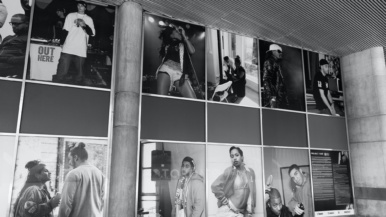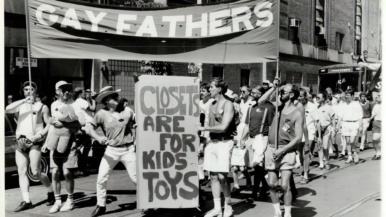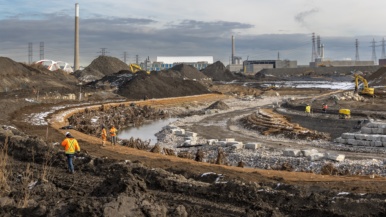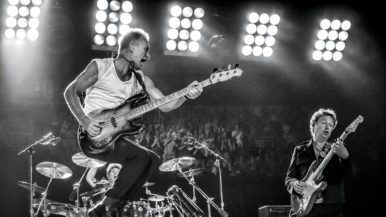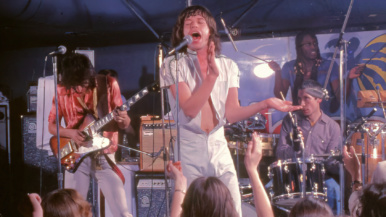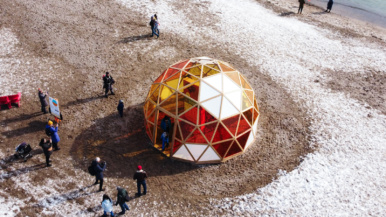This musician recorded an album with Chris Hadfield on a ship in the Arctic

Last year, Chris Hadfield’s son Evan called some of his family’s favourite musicians, writers and filmmakers with an incredible offer: the chance to spend 18 days with him and his dad aboard a Russian icebreaker ship on the Northwest Passage. One of the Hadfield’s lucky picks was Danny Michel, a Juno-nominated singer-songwriter from Kitchener-Waterloo who’d collaborated with Chris before. “Before Evan even finished his sentence, I was like, ‘Yes, yes, yes!'” Michel says. “‘Just let me cancel everything I have planned.'”
So, last August, Michel and about 10 other artists flew to Kangerlussuaq, Greenland (population 500), where they began Generator Arctic, an 18-day expedition along the coast of Greenland and Ellesmere Island. When he wasn’t hiking or exploring, Michel hunkered down in cabin 712 of the Kapitan Khlebnikov, a 24,000-horespower Soviet vessel, and wrote and recorded his new album, Khlebnikov, which gets its release on January 20. The record features strings and brass arranged by film and TV composer Rob Carli, but Michel recorded all the vocals and acoustic guitar tracks on the ship. “I’m trying to see whether we qualify for a world record,” he says. “I think it may the most northern album ever made.” We asked Michel to tell us about the journey, his DIY studio and hanging out with the Hadfields.

“Evan’s vision was to invite a bunch of artists of all types and have them share their experience with the world. Some people were very scientific. For other people, it was more of an emotional thing. Our job was to do what we artistically wanted to do, come back and make sure to share it with everybody.”

“The ship was massive. It had about 80 passengers and 75 crew. It’s used for all kinds of stuff: freight, busting through the ice to make paths for other ships. When I was on it, it was chartered by Quark Expeditions.”

“The ship had a helicopter pad and these Russian choppers so old that they had wood-panel floors. At night, they’d fold the propellers and roll them into a garage literally big enough to hold two cars. It was hilarious.”

“The two rules on the ship were: 1) Never call the ship a boat, and 2) No whistling, which is an old superstition. I never realized how much I whistled. They gave me the dirtiest looks.”

“The whole ship felt like the set a Wes Anderson movie. Every time I turned a corner, I thought, ‘If he saw this boat, he’d film a movie.’ It was just the old Russian style of machinery: gigantic buttons, levers everywhere, very analog.”

“The album I recorded up there is literally all about the trip. I think I say the word Khlebnikov on every song. I rhymed it with Rachmaninoff, cosmonaut, vodka shots. I didn’t want to go on this experience and write just one song about it and put it on my next record. I really got into it. There’s even a song about the engine room.”

“My ‘studio’ was the size of an airplane bathroom. I wasn’t allowed to bring much because of weight restrictions. Mic stands were too heavy, so I put my two Neumann microphones on a tripod I’d borrowed from a guy using gaffer tape from the Russians and a hair tie a woman gave me. It was all MacGyvered. To me, it wasn’t a hindrance. That’s what made it legit.”

“Chris sings a song he wrote in Russian on the record. I sing along in harmony, so I had to learn a bit of Russian. On another track, he sings with the dishwashers from the kitchen. We’d sit in the bar and jam in the evenings with Chris, and these young guys came out and started singing all these Russian songs. They were full of vodka. I was just looking at them like, ‘Oh my God! I gotta get these dudes on the record.’ Without even being able to speak English, I managed to explain to them what I was doing and they were like, ‘Yeah, yeah!’”

“Chris didn’t take a big leadership role. He was just one of us. He would do what we all did—go on adventures, chat. There were never any meetings or rules. It was really cool to hang out with him as just a dude.”

“The scenery was just breathtaking. I don’t know how to describe the vastness. It’s pretty much as close as you can get to being on another planet. There were icebergs coming by you the size of shopping malls—bigger, sometimes. Your brain breaks trying to picture that that’s only 10 per cent of it.”

“Once, we were out in zodiacs, pulling up to see some icebergs, and six humpback whales breached right in front of us. I was like, ‘My brain can’t take any more!’ It was nuts.”

“Another time, we came across a polar bear. We were the first humans he’d ever seen, because we were going through an area that normally only submarines could pass through.”

“We went into great little communities where you’d have a population of 90—plus 170 sled dogs—and everyone had to stay indoors because a bear had gotten into town and they were trying to chase him out. We met one guy who had just hunted a narwhal in a kayak. In a kayak! He was bringing it back to feed his village. This guy was living the same way he would have lived 500 years ago. It made me think: slow down.”

“On one of our hikes, we came across a tiny base with a little airstrip and a few tents. I was standing there taking pictures when I heard a guy start to read one of these abandoned sleds’ manufacturing plates. He goes, ‘Made in Kitchener, Ontario. Does anyone know where that is?’ I was like, ‘What? That’s my hometown!’”

“In Greenland (pictured above), we had some T-shirt days. When we went up north, it got colder. But it wasn’t any worse than Ontario in the winter: -15 degrees. The Americans were having more trouble with that.”

“We were there in the midnight sun. At 4 in the morning, I’d be in bed and feel the ship lunging, hitting ice. I would be like, ‘I gotta see this!’ So I’d put on all my gear and head out to the bow of the boat. It’d be bright out and I’d be all by myself, saying, ‘I can’t even believe I’m taking this in.’”

